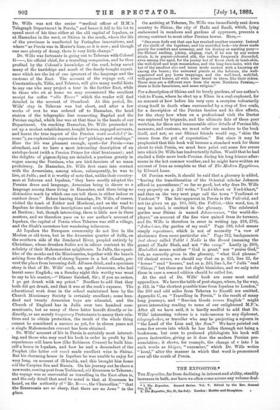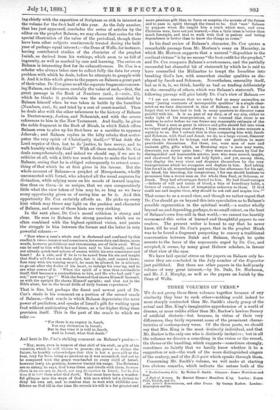THE EXPOSITOR.* THE Expositor, far from declining in interest and
ability, steadily increases in both, nor have we often come across any volume deal-
• L The Expositor. Second Series. Vol. V. Edited by the Bey. Samuel
Cox, D.D.
2. The Expositor, No. 31, for July. London Hodder and Stoughton. .
ing chiefly with the exposition of Scripture so rich in interest as the volume for the first half of this year. As the July number, that has just appeared, concludes the series of articles by the editor on the prophet Balsam, we may choose that series for the special illustration of the value of the periodical, though there have been other subjects continuously treated during the half- year of perhaps equal interest ;—the Dean of Wells, for instance, having contributed studies of the character of the prophet Isaiah, as derived from his writings, which seem to us full of ingenuity, as well as marked by care and learning. The series on Balaam is interesting first for its exhaustiveness. Dr. Cox is a scholar who always takes care to collect fully the data for every problem with which he deals, before he attempts to grapple with it. And it is this which gives to the papers on Balaam a great part of their value. Dr. Cox gives us all the separate fragments concern- ing Balaam, and discusses carefully the value of each,—first, the great passage in the Book of Numbers (xxii., 2—xxiv., 25), which he thinks it probable was the account furnished by Balsam himself when he was taken in battle by the Israelites (Numbers, xxxi., 8), and tried by a sort of court-martial. Then lie deals also with the other references to the history of Balaam in Deuteronomy, Joshua, and Nehemiah, and with the severe references to him in the New Testament. And finally, he gives the noble fragment in the Book of Micah, in which Balak offers Bantam even to give up his first-born as a sacrifice to appease Jehovah ; and Bantam replies in the lofty rebuke that antici-
pates the very spirit of Christianity itself,—" What doth the Lord require of thee, but to do 'justice, to love mercy, and to
walk humbly with thy God 2" With all these materials Dr. Cox deals comprehensively, and indeed we should say, if we are to criticise at all, with a little too much desire to make the best of Bantam, seeing that he is obliged subsequently to retract some- thing of that which he at first gives in his favour. But the whole account of Balsam—a prophet of Mesopotamia, wholly unconnected with Israel, who adopted all the usual auguries for divination, while relying more on his moods of inward inspira- tion than on these.—is so unique, that we care comparatively little what the view taken of him may be, so long as we have every opportunity given us of seeing him as he is. And this opportunity Dr. Cox certainly affords us. He picks up every hint which may throw any light on the position and character of Balaam, and some of those hints are very striking.
In the next place, Dr. Cox's moral criticism is strong and clear. He sees in Balaam the strong passions which are so often combined with the highest spiritual vision, and paints the struggle in him between the former and the latter in very powerful colours : —
" Now when a man's whole soul is darkened and confused by this conflict b twee,. interest and conscience, between duty and desire, mere words, however prohibitory and threatening, are of little avail. What can be said to him which has not been said to him already, and has not already quickened echoes of assent within his own conscience and heart ? As a ride, and if he is to be saved from his sin and taught that God's will does not make right, but is right, and cannot there- fore vary with his varying moods, he must be allowed, he is allowed, to go out after the desire of his heart, to indulge his craving, and to see what comes of it. ' When the spirit of n man thus contradicts itself, God becomes a contradiction to him, and He who had said "go not," now says "go."' With the froward God shows Himself froward, as with the upright He shows Himself upright; and that not in the Bible alone, but in the broad fields of daily human experience."
That is fine, but perhaps the finest and newest part of Dr. Cox's study is his comment on a portion of the second oracle of Balaam,—that oracle in which Balaam depreciates the mere power of preliction, and speaks of Israel's gift for waiting upon God without anticipating the future, as a far higher thing than prevision itself. This is the part of the oracle to which we refer :—
" For there is no augury in Jacob, Nor any divination in Israel; But in due time it is told to Jacob, And to Israel, what God doeth."
And here is Dr. Cox's striking comment on Bantam's praise :— " Nay, more, even in respect of that skill of hie craft, or gift of his vocation, which he still claims to possess, the power to divine the future, he hnmbly acknowledges that this is but a poor gift at the best, very far from being so precious as it was accounted, and not to be compared with the grace vouchsafed to every child of Israel, however lowly his position, however limited his range. The Hebrews are so strong, Ile says, God loves them and dwells with them, because there is no au Jury in Jacob, nor any divination in Israel; but in due time it is told them what God doeth. That mast have been a wonder- ful glimpse into the ways of God with men which led a diviner to deny his own art, and to confess that to wait with childlike cou- fidence on God till in due time He reveals his will is a far greater and more precious gift than to force or surprise the secrets of the future and to pass in spirit through the times to be. God ' met' Balaam to purpose when He taught him a truth which men, and even Christian men, have not yet learned,—that a little trust is better than- much foresight, and that to walk with God in patient and loving dependence is better than to know the things to come."
In his final review of Balaam's character, Dr. Cox quotes a remarkable passage from Mr. Morison's essay on Macaulay, in which Mr. Morison suggests that a natural "disposition to the cardinal virtues" is by no means "the best outfit for the prophet,' and Dr. Cox compares Bantam's covetousness, and the partially successful but shameful bit of statecraft by which he is said to. have counselled the Midianitea to tempt the Israelites into. breaking God's law, with somewhat similar qualities as dis- played by Jacob and Solomon. Nevertheless, sensuality itself, bad as it is, is, we think, hardly as bad as trading deliberately on the sensuality of others, which was Balaam's statecraft. The following passage will give briefly Dr. Cox's view of Balaam
" I am not unaware that we rarely find so many anomalies, so. many ' jarring contrasts of incompatible qualities' in a single char- acter as we have discovered in that of Balaam ; nor do I wish to- forget that we have bad to look in many quarters to discover cases parallel with his. It is no part of my duty, or of my aim, either to make light of his transgressions, or to contend that there is ne problem to solve before we can frame any reasonable estimate of the man. That a man so great in virtues and gifts should fall into vices so vulgar and glaring must always, 1 hope, remain in some measure a mystery to us. But I submit that in thus comparing him with Jamb- and Solomon, with Saul and Jonah, we do, to a large extent, discover the class to which he belongs, and reduce our problem to more practicable dimensions. For these, too, were men of rare and eminent gifts, gifts which, as Browning says, 'a man may waste, desecrate, yet never quite lose ; ' they were men chosen by God for distinguished and honourable service, men who were moved, taught, and chastened by his wise and holy Spirit ; and yet, among them, they display the very vices and disgrace themselves by the very transgressions which we recognise and deplore in him. And taking him for all in all, remembering and making due allowance for his age, his blood, his breeding, his temptations, I for one should hesitate to. pronounce him a worse man on the whole than Saul, or Solomon, or Jonah. They had advantages denied to him. lie had disadvantages —defects of will and taints of blood, a bias of hereditary habit, a license of custom, a force of temptation unknown to them. If God could use and inspire them, why should he not call and inspire him
That seems to us a sound view, and though we rather regret that Dr. Cox should go on beyond this into speculation as to Balaam's, possible regeneration in the spiritual world,—a matter wholly
beyond us, and depending, perhaps, to no small extent, on the bent of Balaam's own free-will in that world,—we cannot too heartily recommend this series of learned and thoughtful papers to our readers. The present writer is bound to say that be never knew, till he read Dr. Cox's paper, that in the prophet Micah was to be found a fragment purporting to convey a traditional conversation between Balak and Balsam, though he quite• assents to the force of the arguments urged by Dr. Cox, and accepted, it seems, by many great Hebrew scholars, in favour of that view of the case.
We have laid special stress on the papers on Balaam only be- cause they are concluded in the July number of the Expositor just published. But there are other papers in the half-yearly volume of very great interest,—by Dr. Dale, Dr. Matheson, and Mr. J. J. Murphy, as well as the papers on Isaiah by the Dean of Wells.



































 Previous page
Previous page